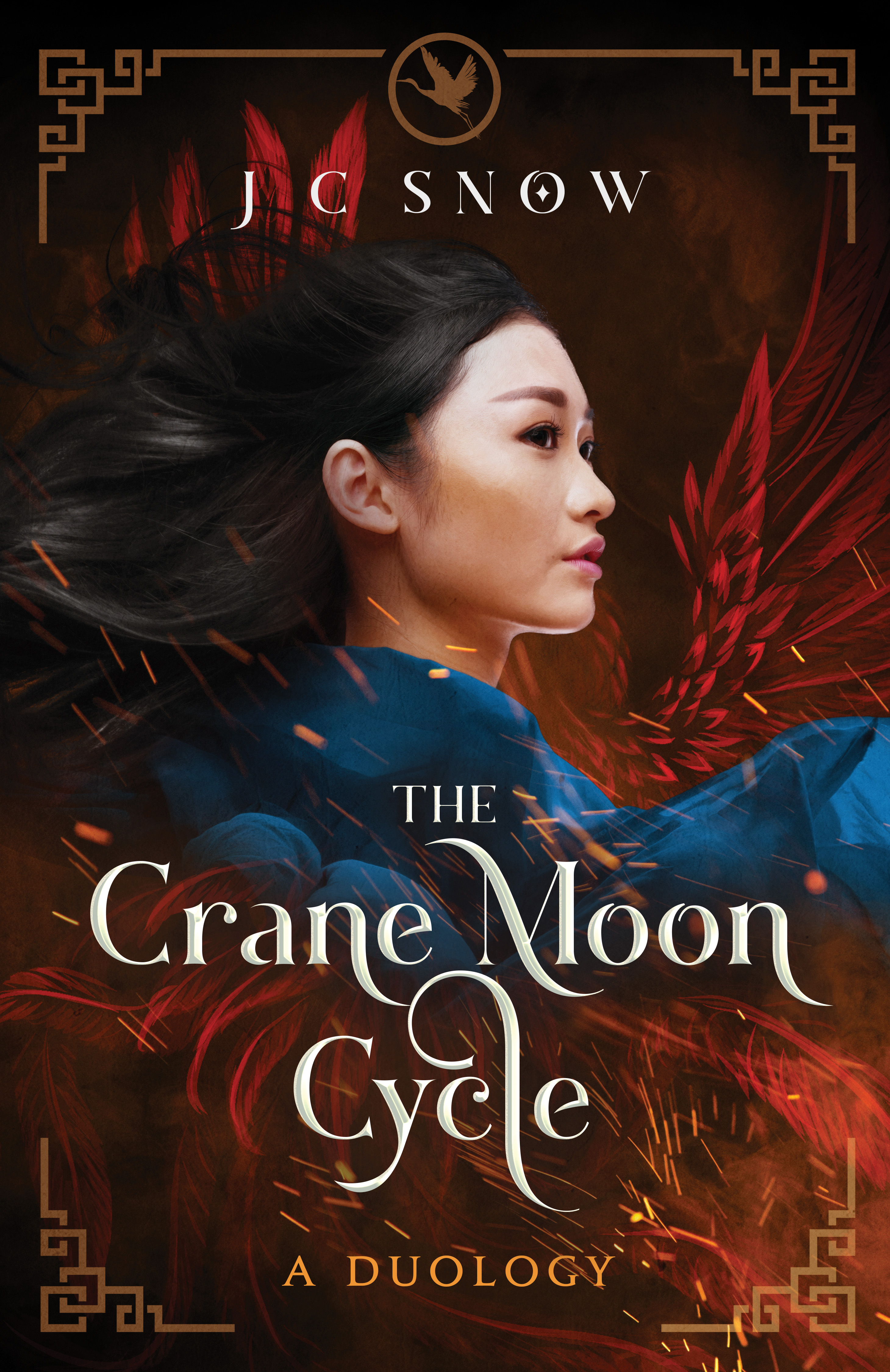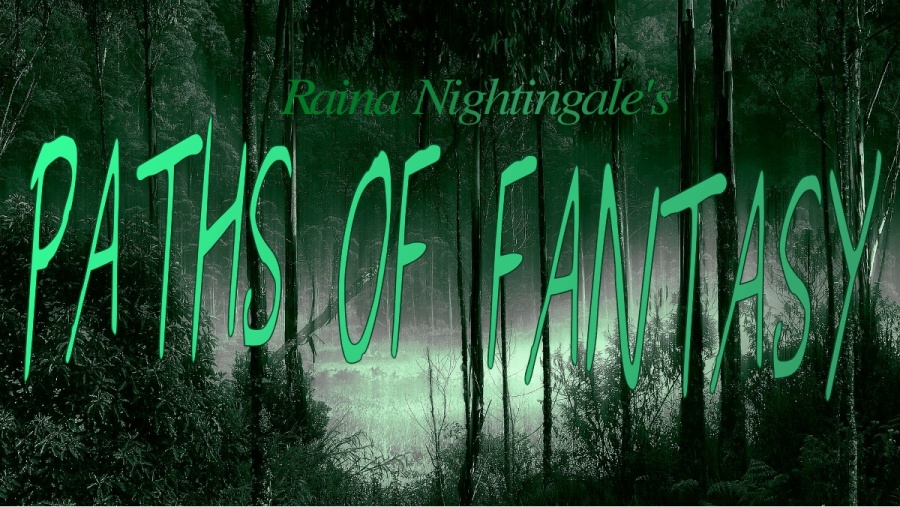The Crane Moon Cycle
 Series: Omnibus (The Phoenix and the Sword, The Shoreless River)
Series: Omnibus (The Phoenix and the Sword, The Shoreless River)
Author: J.C. Snow
Genre: Fantasy
Book Description:
Across wars and worlds, through death and life, in mortal and immortal hearts, the binding of the phoenix holds.
Aili Fallon is determined to escape her past, and won’t let anything get in the way of her training as a combat nurse. But when the woman she loves binds her with blood and disappears in flames, she gambles with her own existence to find her again.
Crossing into a forgotten life and death, Aili is bound by a curse a thousand years in the making. As human wars rage and demons hunt the immortal and defenseless phoenix, Aili and her beloved Liu Chenguang fight to heal the wounds of two lives, with their own hearts and millions of mortal souls at stake.
The Crane Moon Cycle Duology contains the full books of The Phoenix and the Sword and The Shoreless River, a complete epic fantasy of love, loss, and redemption, set in a world of spiritual powers, past lives, and beings of myth and legend.
Review:
I found the beginning rather boring. Though I tend to appreciate slow starts, Aili’s acquaintances were not presented in a way that I found compelling enough to overcome my boredom/dislike for the historical-contemporary vibes of the setting, and I was impatient to get into the fantasy part of the story, and the elements I’d heard about that got my attention. (It is an alternate history/setting, which somewhat diminishes my dislike, but I still wasn’t interested.) Once we meet Liu Chenguang, a mysterious woman to whom Aili is instinctively drawn like iron to a magnet, and who claims to have known Aili in some hidden past, that started to change.
Romantic relationships are a big part of this story – though they are by no means the only strong relationship, for which I am quite glad. I have mixed feelings about them, which is not really a surprise given romance isn’t really my thing. The further into their story one gets, the more one sees the depth and endurance of the connection between Liu Chenguang and Hong Deming – phoenix and mortal, yet kindred souls who fit together perfectly. However, in the latter time line, between Aili and Liu Chenguang, especially in the beginning, I did not see the chemistry. It was not so much that they clashed, as that I didn’t really get to know them. Here are these people, insanely attracted to each other, and having a bit of a fight because it’s just such a strange situation and the past is really complicated, and trust. But I did not know either of them well enough to see it, and I did not get to see them having the kinds of conversations and interactions that would have really let me see deeper into them and their interest in each other. The heat was also a little bit more than I really liked at times.
I think part of it was that the beginning was kind of slow. But after that, the pace picked up too much (at least for me) to get to know the relationships and the characters, and what one did see was more of the kind of romance stuff that just doesn’t work well for me.
That doesn’t mean I didn’t like it. One does eventually get a sense for how Deming and Aili do feel like the same person – but Aili so much later, with so much more trauma backed into her. And when they start to heal some of what’s causing that trauma, one sees more of Deming’s freshness in her again. The sweetness and kindness between Chenguang and her brother, the older phoenix most often called Tainu, really appealed to me.
I really liked getting to see the phoenix approach to suffering and healing. “Pain is pain, and done is done,” they say, as they respond to the call of suffering, healing whoever needs it, regardless of who they are. Because that’s who they are as phoenixes. There’s so much light and hope in that. I really enjoyed it when Chenguang tries to explain that to Deming, when he heals a wounded raider in a village, and Deming protests that these raiders will just go on to cause more suffering. But that’s not what Chenguang sees. Chenguang sees the suffering, the need to heal, and leaves the responsibility for someone does to that person, taking responsibility only for his own actions.
So I really liked the phoenixes, and they’re a good part of what drew me to the book. The concept of immortal healers who cannot kill or harm really interested me, as that kind of connection between the magic and its purpose and what the person can do makes sense to me and is something I don’t really see very often. However, it did not live up to my fullest hopes (emphasis here), as the phoenixes normally can’t even pick up a weapon, at least not a weapon, but they develop some kind of work-around with a demonic weapon to be able to harm and repel demons. Those kinds of loopholes are one of the things I really hate sometimes, and it felt like a loophole that didn’t fit to me.
One sees Chenguang changed by the incredible suffering she’s been through over and with Deming, and I’m not sure how I felt about some of those changes in her attitude. There’s anger and even hate born in her, and it’s hard to understand how that works with the phoenix and being a healer like that. I’d think those emotions would be as at odds with the power as weapons. That the wishes would be impossible, or incredibly painful, or self-destructive, though Chenguang’s feelings are very understandable, given what happened. And she’s bound to Aili/Deming, who is human, in a way no other phoenix is. And that binding has given Aili many phoenix powers. So maybe that could be part of it?
Something else to be noted is the struggles they have, because Aili feels like Chenguang loves Deming, not her: and she is so far removed from Deming’s life, experience, and feelings, that as far as she’s concerned, she’s not that person any more. And Chenguang has changed, too. So what does loving a person really mean, and how do you go about it?
I really liked Tainu, the eldest of the phoenixes. He’s not a normal phoenix – most, apparently, are quite unlike him, being very solitary and isolationist, which to some extent makes sense the way that they are hunted, tortured, and used – but he’s a lot of what I imagined as the “type” of the phoenix. Not all of it, but a lot of it, and he feels very real. As the story progresses, it dives into his past, and one sees the depth of the brightness in his character. One also sees his struggles with fear, with the fear of loss if he ever really gives his heart to a mortal. At the same time, he’s endured everything with love. And one of the things I really loved about the phoenixes is how, somehow, in a way that really makes sense, the healing within them guides them through all the trauma and horror they experience, and lets them continue to live in healing, in light. Suffering what they suffer, but taking joy wherever they can, not clinging to the suffering in resentment. I really liked it.
“Pain is pain, and done is done.”
It only grows more beautiful, as another character’s story expresses what Chenguang tried to explain to Deming so long ago: he can only heal – or not. And the one who has healed, may choose to reform his life and be better.
In fact, that may be what healing is. The cruelty, the evil that he expresses may be a symptom of wounds carved into him.
For the most part, I liked the magic, and I definitely found it intriguing and thoughtful. There’s a lot of power in blood – not just phoenix blood, though it seems most potent, but other blood, too – and that’s a theme that seems to resonate deep in the human psyche (even if we see how much it recurs in religion and tales), and it was interesting, sometimes thought-provoking. Demons cultivate resentment for power – but in the end, it appears they don’t have to live that way. Maybe they won’t have as much power if they don’t, but it seems it may not be foundational to their existence. Human beings relive trauma and are drawn down the darker paths, of misery or evil, that open within them, guided into resentment by demonic pacts. And the phoenix heals with blood. It fit together, and it was interesting. I also liked the intuitive level of the magic, how a number of times the phoenixes do things by intuition – and, perhaps, intuition guided and perfected by love.
One thing I really, really loved is the story of the demon who rejects what he’s spent his life on – but what he never really meant to be.
After they had walked for a while more, Zhu Guiren spoke again. “I spent two hundred years creating the great array by doing all I could to ensure that the suffering of the people was as great as it could be. None of it was by my hand, but all by my design, so that each person who died would produce resentment at the highest possible level. Those I caught in the array — they still feel it. Their descendants belong to me too, drawn into as much resentment as the array can produce in the circumstances of their lives. Every day, they relive it for me, and it feeds into me to strengthen me. I don’t even have to cultivate it. It’s like my heart pumping blood.”
Tainu sighed. “Arciniang–”
“That’s why,” Zhu Guiren said. He knew Tainu wanted to say something comforting, but there was nothing to say. “That’s why I need to destroy it.”
Even if it kills him. Because he doesn’t want to live off suffering anymore. It’s not that he doesn’t want to live, but he can’t endure living that way any longer.
I do warn it is sometimes pretty dark. It isn’t gory, the darkness is more interior than that. It’s in horrible things done to people’s souls, through each other. Some of it is quite icky, and I’m not sure what kind of icky. And some of it is really, really sad.
I also didn’t particularly appreciate the association of crows with (usually evil) demons.
Another thing I loved about the story is how the lovers won’t abandon each other. Not for anything. They won’t leave each other for their own survival, or for a better chance. And to reiterate, what I liked most, what the phoenixes capture in who they are: the pain is pain, the sorrow sorrow. But done is done. Joy is joy, love is love, and there is happiness. Is there a path not to cling to pain? To let it be and let it go? To hear the joy wherever it is, cultivate the happiness, not resentment? Live again after suffering and forgiveness? Let go regret and guilt and resentment, anger, hate, and all the things that give power to evil – and live and love?
There’s also some very nice interweaving of themes and foreshadowing, with a single sentence sometimes in one time-line or story, that’s echoed again and either really neatly foreshadows something, or is drawn up into the thing. Many things are woven together, but not in a way that feels forced. There are also many cool and fantastic creatures.

Pingback: August News, Updates, and Featured Sales and Books – Enthralled By Love